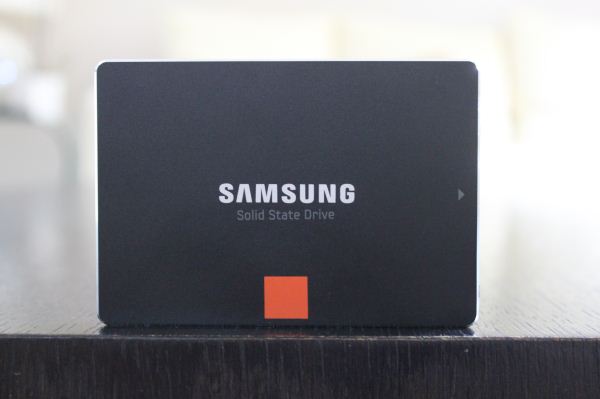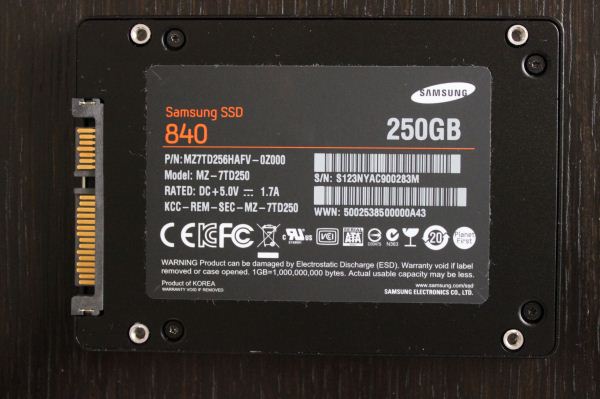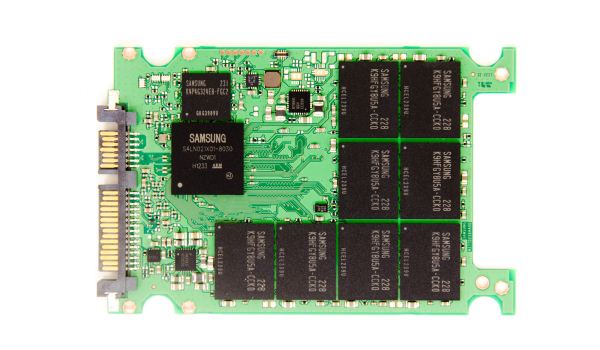Samsung SSD 840 (250GB) Review
by Kristian Vättö on October 8, 2012 12:14 PM EST- Posted in
- Storage
- SSDs
- Samsung
- TLC
- Samsung SSD 840
The Samsung SSD 840
Now it's time to look at the Samsung SSD 840 itself. Performance differences between different capacities are tangible. Sequential write speed in particular increase with larger capacities. With MLC NAND based SSDs 256GB and 512GB models usually perform around the same because 256GB of NAND is able to saturate the limits of the controller but as TLC NAND has longer program times, you will need more NAND dies to hide the additional latency.
| Samsung SSD 840 Specifications | |||
| Capacity | 120GB | 250GB | 500GB |
| Sequential Read | 530MB/s | 540MB/s | 540MB/s |
| Sequential Write | 130MB/s | 250MB/s | 330MB/s |
| 4KB Random Read | 86K IOPS | 96K IOPS | 98K IOPS |
| 4KB Random Write | 32K IOPS | 62K IOPS | 70K IOPS |
| Cache (LPDDR2) | 256MB | 512MB | 512MB |
| Samsung SSD 840 Pro vs 840 vs 830 | ||||
| Samsung SSD 830 (256GB) | Samsung SSD 840 (250GB) | Samsung SSD 840 Pro (256GB) | ||
| Controller | Samsung MCX | Samsung MDX | Samsung MDX | |
| NAND | 27nm Toggle-Mode 1.1 MLC | 21nm Toggle-Mode 2.0 TLC | 21nm Toggle-Mode MLC | |
| Sequential Read | 520MB/s | 540MB/s | 540MB/s | |
| Sequential Write | 400MB/s | 250MB/s | 520MB/s | |
| Random Read | 80K IOPS | 96K IOPS | 100K IOPS | |
| Random Write | 36K IOPS | 62K IOPS | 90K IOPS | |
| Warranty | 3 years | 3 years | 5 years | |
Performance wise the 840 does well but can't challenge the 840 Pro. Read performance is actually nearly on-par with the 840 Pro but write performance is behind due to the use of TLC NAND. I should add that write speeds are still adequate for a consumer drive. In some ways, the 840 can still be a healthy upgrade from the 830. Even though sequential write speed is lower, the increase in random read and write speeds can compensate. Still I suspect most 830 users will want to upgrade to the 840 Pro at least, if they choose not to wait for the next generation of SSDs.
| Samsung SSD 840 Series Pricing | ||||||
| 64GB | 128GB | 256GB | 512GB | |||
| Samsung SSD 840 | N/A | $109.99 (120GB) | $199.99 (250GB) | $449.99 (500GB) | ||
| Samsung SSD 840 Pro | $99.99 | $149.99 | $269.99 | $599.99 | ||
Pricing isn't as aggressive as it could be but keep in mind that the above prices are suggested retail prices. Street prices can easily be ~$20 less and I wouldn't be surprised to see the 120GB SSD 840 retailing for less than $100 (and even $70-80 when on sale). Also note that we're still very early in the production of TLC NAND. Over time you can expect a more appreciable difference in pricing between TLC and MLC NAND.
Based on the chassis alone you can't really tell the difference between the 840 and 840 Pro. Both use a similar matte black plastic design. The 840 measures in at 7mm tall as well, just like the 840 Pro. It's only when you flip the drive around that you can see that it's actually an 840 and not 840 Pro.
Unfortunately, we don't have any pictures of the internals at the moment. Samsung uses special pentalobe screws (similar to MacBook Air) and finding suitable screw drivers in Finland isn't as easy as in the US. In order to get the review out as soon as possible, we decided not to wait for the screwdriver to arrive from the US. We are, however, looking at a PCB that's indentical to the 840 Pro (i.e. eight 32GB TLC NAND packages). The only difference are NAND part numbers.
The 840 Pro
Test System
| CPU |
Intel Core i5-2500K running at 3.3GHz (Turbo and EIST enabled) |
| Motherboard |
AsRock Z68 Pro3 |
| Chipset |
Intel Z68 |
| Chipset Drivers |
Intel 9.1.1.1015 + Intel RST 10.2 |
| Memory | G.Skill RipjawsX DDR3-1600 2 x 4GB (9-9-9-24) |
| Video Card |
XFX AMD Radeon HD 6850 XXX (800MHz core clock; 4.2GHz GDDR5 effective) |
| Video Drivers | AMD Catalyst 10.1 |
| Desktop Resolution | 1920 x 1080 |
| OS | Windows 7 x64 |













86 Comments
View All Comments
mayankleoboy1 - Monday, October 8, 2012 - link
Samsung is known to release only a few firmware updates (unlike SF).But due to the somewhat quirky nature of TLC NAND, do you expect Samsung to release a newer firmware , with maybe better read performance , or better TRIM support ?
Taft12 - Monday, October 8, 2012 - link
Who cares?? Frequent firmware updates are a sign of an incompetent engineering and testing. I'll stick with the vendors known for getting it right the first time thank you very much.JuneBugKiller - Monday, October 8, 2012 - link
If Samsung 840 120GB cost's $109.99 and you can get an OCZ Vertex 4 128GB for $104.99, which is faster in 80% of the benchmarks and is $5 cheaper then who's going to want it? So what if the price goes down to $80, are people going to save $25 thinking their hard drive is going to die twice as fast. I have bought (with works money) around 30 ssd's including Intel 80GB & 160GB Silver Case, Intel 710 100GB, Vertex 3 Max IOPS 120GB and Vertex 4 128. So far I've only had 2 ssd's go bad and they were both Intel 80GB ssd's. One wouldn't power on and the other reported at 8MB. Intel replaced them under warranty.The point is I have been buying SSD's for years and I just don't see how anyone would want these samsung ssd's. Samsung is famous for huge margins on each product. When a company pockets $240 off of a $500 tablet and their name isn't Apple then something is wrong.
JarredWalton - Monday, October 8, 2012 - link
Wow, talk about skewing the data by cherry picking the worst-case numbers for the 840. The Vertex 4 is only 85% faster in one specific test: AS-SSD Write performance. Of course, in the AS-SSD Read performance it's also 10% faster than the Vertex 4 256GB, but you just ignore that? Samsung also has some of the best SSDs in terms of large reliability figures, so even if the 840 is slightly slower than other drives in some tests, it may be the better option. Also don't forget to factor in that the 840 appears to be well-tuned for light workloads (e.g it's near the top of our light workload results).Personally, I think the 840 needs to come in below the current 830 drive prices to make sense, and it probably will not long after the official release. 128GB 830 drives already go for under $100, and 256GB drives have been at $200 for over a month now -- likely all in preparation for the release of the 840. TLC NAND is cheaper to manufacture (per GB), and long-term it will be significantly more profitable for Samsung. Get some good DSPs added into the mix and I wouldn't be surprised to see most SSDs in two generations being TLC based, with MLC moving to the enterprise level and SLC basically going away because it's too expensive.
JuneBugKiller - Monday, October 8, 2012 - link
No I'm talking about counting each benchmark add the total and divide the number by how many OCZ Vertex 4 won and it was over 80% of the total number of benchmarks. How is Samsung a better option? TLC over MLC, OCZ fastest drive to Samsungs slowest new drive. Of course Samsung is going to make more profit but why would you want to spend the same amount on a slower drive with less endurance?JarredWalton - Monday, October 8, 2012 - link
Sorry, 80% of benchmarks is correct; I read that wrong. But let's put that in perspective:http://www.anandtech.com/bench/Product/678?vs=628
If we look at average performance across all benchmarks, the difference between OCZ Vertex 256GB and Samsung 840 250GB is a 12.4% advantage for OCZ. However, OCZ hasn't exactly been free from firmware issues. That right there is the reason many people will pay a bit more for a Samsung (even if it's slower).
Would I buy an 840 right now for $200 or whatever? Definitely not -- I'd actually take the 830, just for proven reliability over time. Give the 840 a couple months just to be safe, then check the prices. If it's still more expensive than the Vertex 4, sure, go for OCZ if you'd like. If they're the same price, though, the 12% performance is practically meaningless for most consumer workloads.
sean.crees - Monday, October 8, 2012 - link
Because it's not just about performance, it's also about reliability. This is user data we are talking about. Even a single loss could be catastrophic. OCZ doesn't have the reliability track record that Samsung and Intel has, and for that reason there are many people who will only ever buy from Samsung or Intel. So then OCZ isn't even mentionable. It doesn't matter if they are faster because who cares if your data is at risk?Also you have to consider that the REAL WORLD difference between any modern 6Gbps SSD is negligible, so then performance means even less. It ends up being a contest of reliability instead of a contest of speed. In that contest, OCZ loses.
krumme - Monday, October 8, 2012 - link
I would want it :)We have about 7-8 ssd in the house, about 3 of those is vertex 3 ssd, and there have been realiability and firmware issues.
I think ssd speeds since the last 2 years have been good enough and would prioritize reliability any day.
I had to replace an sandisk u100 in my Samsung 9 series x3c to a faster one, but that was because the u100 was like a return to 4 years ago. Its a good backup now.
Now hopefully reliability is there, and prices will go down so everyone can afford it. We dont need more firmware updates and shit. Its like the first 3d gfx in the mid 90, - a mess.
But you are right Samsung is starting to get expensive, and charge for the brand. Wether you like it or not it will certainly mean more Samsung reviews too. Being a big boy, have advantages :)
Taft12 - Monday, October 8, 2012 - link
"If Samsung 840 120GB cost's $109.99 and you can get an OCZ Vertex 4 128GB for $104.99, which is faster in 80% of the benchmarks and is $5 cheaper then who's going to want it?"A person who values reliability at a value higher than $0 will choose the non-OCZ product every time.
Jaybus - Thursday, October 11, 2012 - link
Time will tell. The TLC NAND should end up around 30% cheaper per GB than MLC. Then it will come down to buying a 240 GB MLC for $200 or a 320 GB TLC for the same price.